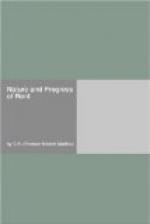A similar effect would be produced by the introduction of new machinery, and a more judicious division of labour in manufactures. It almost always happens in this case, not only that the quantity of manufactures is very greatly increased, but that the value of the whole mass is augmented, from the great extension of the demand for them, occasioned by their cheapness. We see, in consequence, that in all rich manufacturing and commercial countries, the value of manufactured and commercial products bears a very high proportion to the raw products;(10) whereas, in comparatively poor countries, without much internal trade and foreign commerce, the value of their raw produce constitutes almost the whole of their wealth. If we suppose the wages of labour so to rise with the rise of produce, as to give the labourer the same command of the means of subsistence as before, yet if he is able to purchase a greater quantity of other necessaries and conveniencies, both foreign and domestic, with the price of a given quantity of corn, he may be equally well fed, clothed, and lodged, and population may be equally encouraged, although the wages of labour may not rise so high in proportion as the price of produce.
And even when the price of labour does really rise in proportion to the price of produce, which is a very rare case, and can only happen when the demand for labour precedes, or is at least quite contemporary with the demand for produce; it is so impossible that all the other outgoings in which capital is expended, should rise precisely in the same proportion, and at the same time, such as compositions for tithes, parish rates, taxes, manure, and the fixed capital accumulated under the former low prices, that a period of some continuance can scarcely fail to occur, when the difference between the price of produce and the cost of production is increased.
In some of these cases, the increase in the price of agricultural produce, compared with the cost of the instruments of production, appears from what has been said to be only temporary; and in these instances it will often give a considerable stimulus to cultivation, by an increase of agricultural profits, without showing itself much in the shape of rent. It hardly ever fails, however, to increase rent ultimately. The increased capital, which is employed in consequence of the opportunity of making great temporary profits, can seldom if ever be entirely removed from the land, at the expiration of the current leases; and, on the renewal of these leases, the landlord feels the benefit of it in the increase of his rents.
Whenever then, by the operation of the four causes above mentioned, the difference between the price of produce and the cost of the instruments of production increases, the rents of land will rise.
It is, however, not necessary that all these four causes should operate at the same time; it is only necessary that the difference here mentioned should increase. If, for instance, the price of produce were to rise, while the wages of labour, and the price of the other branches of capital did not rise in proportion, and at the same time improved modes of agriculture were coming into general use, it is evident that this difference might be increased, although the profits of agricultural stock were not only undiminished, but were to rise decidedly higher.




